Moving On......
Having made it out of Russia, I'm off to new countries, new languages, new experiences and new blogs. To continue reading about my adventures abroad, please read 'Die Stadtluft macht Frei' from now on.
Address: http://mishainberlin.blogspot.com
cheers!
Reflections in a Blog
Barbara Ganley, Middlebury's blogging guru and founder of the 'Blogging the World' project asked her participants to share some thoughts on their blogging experience this last semester. Here's mine:
Dear Barbara,
Having recently left Russia, I find myself reading past entries from my time in Moscow. Some entries I completely forgot ever writing, some I wish I could forget, but all in all it was a strange experience reliving my semester abroad, saved in written form. It was like seeing one’s reflection in a lake: sometimes it’s like looking in a mirror. One remembers everything, as it was describe and can leave thinking, ‘Yup, that’s what it was like.’ Other times the images are distorted, abstract and vague. I could always recognize myself and the general feelings/happenings that I experienced, but the colors that painted my emotional landscape caused ripples in my reflection. I began doubting myself: “Was it really that bad? Could I actually been that angry/frustrated?” Although only a few months in the past, these adventures seem like years ago; the overload of foreign sights, sounds, and tastes has left little room in my memory for the details that I recorded in my posts. For that reason, I’m thankful that I kept this blog. It’s a reminder, a sort of memoir, not only of what happened but of how I felt when it happened.
At the end of January, I left Russia to spend a month in Vienna with a friend of mine before starting my next semester in Germany. It was the weirdest of feelings; I was very glad and relieved to finally leave a place that can be so hard to live in, but it was difficult at the same time. I had adapted to life in Russia. I could speak the language, for the most part without having to think incredibly hard about it; I knew how to interact (or not interact) with those around me. In the end, I felt as though I belonged there. My friend picked me up at the airport in Vienna, and for the entire first week, I was in utter shock. It wasn’t about Vienna being European and different from the States; the problem was that it wasn’t Russia. I suddenly found myself out of my element, immediately forced into a new way of life in an entirely different language. That first week, I tried cleaning up my computer, but for the most part, I would just read my old blog entries. It was comforting somehow; I still don’t know exactly why. It reminded me of a time when I could actually form a complete and coherent sentence, when things still seemed familiar, and most of all, when I was rooted somewhere and enjoying it.
All in all, I guess my Russia blog has made me see Russia with new eyes, even if it is from far away (in both cyber- and real-space). This is the greatest gift keeping a blog has given me. I didn’t study in Rio or Paris, but the perspective I got from writing and later rereading my posts has brought me to the conclusion that Russia actually was an alright place to be.
Thanks for this project and its reflections,
(Forever) Misha
The Derevnia

Our Choir in the Western Russian village of Luzhnaia, Smolensk province.
Although a trip to Siberia gave me a more fully-formed understanding of the Russian psychological and geographical landscape, Irkutsk was still a city, albeit a small one. I knew the untouched Russian soul lay somewhere farther afield in that curious wilderness Russians call ‘the derevnia’. When buying my ticket out of the country, I calculate a trip to such a place into the itinerary.
Sometime in late-October I made the aquaintance of Yelena Minyok thanks to a friend of my program’s director (Chris). He arranged a chance for us to meet after a conversation in which I explained my interest in Russian folk music. Yelena is a folklorist and has spent the greater part of her life researching the folklore, music and traditions of Russia’s dying village populations. In true Russian fashion, she invited Chris and me (two complete strangers) over for dinner where we met her family (husband and documentary filmmaker, Sergei, and children Valeria and Fedia). For me it was a chance to make a valuable contact for a possible senior thesis on Russian folk traditions, but Chris, knowing that Yelena lead expeditions to Russian villages, had other plans in mind, namely to get me onto one of these trips. After a pleasant dinner filled with informative tidbits on Russia’s folk life, Chris began explaining my background with Middlebury’s Russian Choir, telling Yelena what a great voice I had (in all honesty, he had only heard me sing once. It was a short version of ‘Pchyolechka Zlataya’ performed during a group trip to the banya).
Yelena described her trips to the village, done with the help of an American NGO called Earthwatch, and said it was completely possible for me to come on the next trip in late January. Aside from trans-continental plane tickets and visa fees (expenses I had already taken care of) Earthwatch charged all its ‘volunteers’ the modest fee of $2,500(!). Sensing that Yelena noticed the look of shock and dispare at my budding dreams crushed, I explained that, as a student, I wasn’t in a position to be able to afford such a fee. Without thinking twice, she said that the Earthwatch budget allowed her to take a small number (one or two at her descression) of staff members who, in addition to helping with the volunteers’ work of recording and interviewing, helped with translation for the volunteers who didn’t speak Russian. She was confident that with her recommendation and an immediate email sent to Earthwatch headquarters, I would be able to join the expedition for a greatly reduced price, which would only include transportation to/from the village, food, room and board.
She sent me home with an expedition briefing and the next day, I wrote an email to Earthwatch, in which I beggedt o be accepted onto the project, assuring them that it would be with Yelena’s blessings (the woman knew me for less than 24 hours and was already prepared to write me a recommendation! Russians are just amazing like that sometimes). A few weeks later, I received confirmation from both Earthwatch and Yelena and spent the remainder of my semester looking forward to an adventure most tourists and exchange students alike don’t often experience.
Only a few, hectic days after returning from Irkutsk, I boarded the bus with the other team members that would take us (almost the entire way) to the village of Luzhnaya, situated in Western Russia three kilometers from Belarus and 30km from Ukraine. Arriving late at night, members of the village’s choir greated us for introductions, tea and cakes.
Already approaching midnight, sleeping arrangements were agreed upon. The team’s four members (two volunteers, another staff member/translator and myself) were given three beds at Valentina Ilinichna’s house while Yelena would stay at another choir member’s house. Those of you who mastered arithmatic at an early age may have noted that this all adds up to four beds and five people. Being the only man in the group, I was offered the stove to sleep on. Russian stoves are typically 8x8 meters in area and reach nearly all the way up to the ceiling with about a meter of clearance. The stove is the heart of the house, providing heat, a place to cook and, as some believe, a home for the ‘domovoi’ (house spirit; more on this later). It is also a ‘saintly place’ (svetoe mesto) in Russia and is typically reserved only for the very young, the very old and those who are sick. Although I didn’t fit into any of these catagories, I was the only man and therefore entitled to the best sleeping arrangements (later during the trip, I would learn that in the old Russian view of the world, there existed animals and men with the members of the female sex lying somehwere between the two. This explained where I slept, why all the old village ladies loved me right off the back and why I was always served first and at least three times more than the other team members).

Valentina Ilinichna, our hostess, with her great-granddaughter
The next morning, Lena (as Yelena insisted we called her) returned and prepared some breakfast kashia (oatmeal/purage) for everyone before going over the first day’s plans, which included getting groceries at the village’s ‘magazin’ (store – it was more like a pioneers’ outpost, really) and making a visit to the mayor’s office. Word on the street was that the mayor had gotten some heat from the regional authorities because of our visit. All of our documents, papers and permissions where in order, and Lena described this visit as a mere formality. She took me with her (since everyone in the village, made up almost entirely of women, absolutely loved young, unmarried men. Everyone seemed to have a daughter or granddaughter who would be just perfect for me). Armed with passports, documents from the Russian Center for Scientific Research and chocolate, the two of us went and introduced ourselves to the mayor and her staff of entirely female aids who all did their best to completely downplay the need for us to come in the first place (despite the fact that it was their phone calls to choir members who brought us to the office in the first place). They were all very friendly and invited us to joing their New Year’s celebration, which, judging by the half-empty bottle of vodka standing among countless ‘salad’ dishes, had started well before our arrival. Although it was already January 13th, it was still New Years Eve in Russia, or rather Old New Years Eve. Before the Revolution, Russia operated on a calender fourteen days behind Europe’s; as a result, they have two New Years celebrations on either side of Orthodox Christmas (January 7th) – Old New Year’s and new New Year’s. All I have to say about this is only in Russia could something that sounds so rediculous happen.
We called the other three team members down to the village office and told them to bring a bottle of vodka. Between eating the delicious mushroom, tomato and zuchini salads (all homemade and from personal gardens) and making toasts, the mayor told us about the area she was responsible for, which included 7 villages. Like most of rural Russia and the American Midwest, villages are simply dying out. In her electorate alone, each year fifteen people die while only one is born. This statistic was easy to see in the village, where the amount of children/young people could be counted on ten fingers. Most students and young adults move out in favor of universities and better job opportunities in the larger cities.
During our celebrations, the mayor repeatedly asked us not to tell the regional authorities that we had been drinking together (since our visit to the mayor’s office would have to be followed up by a trip to the regional office in Yershchiche). Lena wagered that the regional authorities would say the same thing since for the most part, Russian introductions practically require at least one vodka shot. We were unfortunately unable to proved this hypothesis right or wrong since a few days later, while we were waiting for the bus to Yershchiche, we ran into the mayor. She told us we didn’t have to go after all. She’d made a call on our behalf and taken care of everything. We were all grateful to have more time for our research but realized that this act of kindness was probably also a measure taken to make sure we wouldn’t share too many details of our Old New Year’s Eve at the mayor’s office with the regional bosses. All in all, that day I checked off ‘drinking with an elected official’ from my list of things to do before I die.
Similar spontaneous gatherings took place throughout our stay. On (Old) New Year’s day, we went to church services in the neighboring village of Kuzmichi where we met the region’s batushka (father) and inquired about his plans for the upcoming Epiphany holidays. Upon hearing about our visit, Lina Sergeevna, one of the village’s many sweet old ladies, came to the chapel to meet us. Lena had met Lina the previous summer on a similar trip with another Earthwatch team and apparently made a lasting impression, so much so that Lina simply had to come out and meet us. After the service, Batushka Nikolai showed us around the church and told us a little about its history. This had to do mostly with its recent history of theft. All over the cold building were empty frame and holes in walls and gates where one would expect to see icons. Nikolai explained that althought people had stolen from the church’s treasures before, the worst theft was made shortly after the police paid a visit to make an inventory of the most valuable icons. Within days, the church was robbed of over thirty icons, most of which were on the inventory. The theives were only middle-men who made small money (that goes a long way in the village) for their crime while those they stole for would sell the works for hundreds of thousands of dollars.
After this sad history, it was a releif to be invited for tea by Lina Sergeevna. It was a short walk to her beautiful house (with two stoves) where she made a huge table for us (‘to make a table’ in Russian means to set a table with massive amounts of food and drink and is common practice when guests come). We realized that when she invited us for ‘tea’, she really meant a New Years lunch.
“It’s New Years,” she said, “I figured I’d be having some guests,” and proceeded to open jar after jar of salads and preserves while taking out meat dishes and sweet dishes from her kitchen stove. After finding enough chairs for everyone and pouring a glass of home-made wine for all, we began another delicious meal in the country.
Lina Sergeevna told us about the last team, her husband and family and generally about her whole life, which despite having its fair share of sadness, has been for the most part blessed. Before our goodbyes, I was sent to get water from the river. Wherever we went, this was essentially my only responsibility as the man, which was fine with me (personally, I’d rather spend five minutes fetching water than twenty minutes doing dishes any day). When we left, Lina had certainlay left her mark on our hearts. Although I’d experienced Russian generosity before (both from Lena and in Irkutsk), this experience went far beyond any previous one. Not only had Lina shared her house and food with us but also her life. It was especially overwhelming and hard for our volunteers to leave; such generosity towards strangers was unthinkable for them, especially coming from a Russian (Russians don’t really have that kind of a reputation in the States, do they?).
This generosity often expresses itself in Russian eating practices. Ever house we went to felt obligated to give us their best food and hospitality. As a man (and a young, growing one at that), my plate was never empty and I did my best to finish the massive amounts of various salads, potatoes, meats and saalo (pig fat) that were piled on my plate. Although this was a big job, I managed, only running into problems when there was another man at the table. Along with recievingt a ‘man’s plate’ of food, I also received a ‘man’s cup’ of vodka, many of them, in fact. I say a cup because that how they drank it. Someimes there were large shot glasses reserved for the women, but for the most part, my glass could hold 100 grams and indeed did if there a a Russian pouring it (the realm of alcohol is also considered men’s work and the opening and pouring of any alcoholic beverage is always done by men). ‘Peer pressure’ doesn’t quite describe how they got me to drink so much. In Russia, refusing to drink with someone, especially another man, is considered a sign of disrespect (indeed, Russians will always ask, “A chto? Ty ne ovizhaesh’ menia?!” – ‘What? Don’t you respect me?’), so I tried to do what was culturally expected of me, often to the detriment of my responsibilities to the team. One or two cups tended to improve my fluency exponentially; it was cups three to six/seven/I lost count that really brought the difficulties. Nonetheless, I still had less troubles navigating the iced-over road than our sober(er) volunteers going back to our house every night.
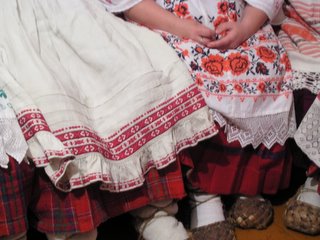
One night we did a recording session with the ladies in costumes. These clothes are all hand made from scratch and have been passed down from generation to generation.
Despite what my account thus far may suggest, our trip was research-oriented. In the evenings we would record hours of folk songs from Luzhnaya’s choir while the days were generally spent interviewing individuals from the choir and their family members. The topics of our questionaires were Witches and the Domovoi (house spirit, from the Russian ‘dom’ - house). My friends in Irkutsk studied the Domovoi in their culture class as a vestige of the past, but this belief in a spirit that protects your house, farm and family is by no means dead. During the beginnings of the interviews, most of our informants were skeptical or outright rejected the Domovoi’s existence, but usually with time and question designed to open them up (“But has anyhone ever talked about him? Your mother/grandmother, maybe?”), they would recount some amazing stories. Because the Domovoi foloklore in that area of Russia was somewhat less elaborate (for example, house spirits wouldn’t fight with neighboring house spirits, they didn’t have a specific appearance, and they were always benevolent, never punishing the household for buying the wrong cattle or not leaving it kasha under the kitchen table), I was personally more fascinated by the village’s stories of witchcraft.
Many members of the community warned us that our hostess, Valentina Ilinichna, was a ver powerful witch who even had horns on her head. She, of course, would never tell us if she was a witch, but rather revealed that she was a healer. In Russian folklore, there’s no real difference between these two terms except one has negative conotations: witches will say they’re healers and healers will accuse others of being witches. Further, there is no white or black magic associated with these two titles; in Russia, magic is magic no matter by whom or how it is used.

Oftentimes, the clothes would have messages written to the girls suitors: this one reads, "Fenya, I sing to you about my love for you." Interesting for those Russian-speakers out there, it's not written correctly but phonetically ('a's instead of 'o's).
Russia’s folk culture of magic is very much alive, even in the cities (Moscow late-night commercials sometimes featured witches, promising to return husbands and cure drunkenness, among other things). This fact can be attributed to Russia’s late adoption of Christianity in 988 A.D. Pagan traditions were already very established by then, and the Orthodox Church simply grafted its religion over that of the pagan Slavs (that is, solstices, equinoxes and festival of the harvest became important saint days or otherwise Christian holidays). For that reason, Russian culture may seem very religious on the surface, but its deep roots are extremely pagan. In the village we heard stories of witches taking animal form, cursing people (literally ‘ruin’ or ‘spoil’ them, like fruit or meat) and dying long, painful deaths while crying in agony in inhuman, animal voices.
A witches death is particularly difficult since she must transfer her/his energy to someone else. Basically someone becomes a witch (or socerer for that matter. Some typical gendered differences differentiate witches from warlocks. Unlike women, men are thought to be capable enough to learn magic from books and are seen as typically more powerful than women). After dabbling innocently enough in magic. At some point, demons (before Christianity, simply spirits) begin calling up her/him to do magic. You see, witches are believed to have more energy or life force than normal people and therefore must use it some how. Demons are said to ‘strangle’ a witch until she uses her energy, for any purpose really, sometime against her own children and family just to stop the spirits. Similarly, a witch can’t die until she releases this energy into someone/something else. Sometimes the witch’s children take this energy, becoming witches themselves with the same obligation to demons; if they are very young, the demons then wait until the 18-20th birthday to beginning demanding work from the witchin question. If no one in the family wants this responsibility (resulting in no one wanting to touch the dying witch and small children being kept far away), then sometimes an animal is brought in order for the witch to die. One story from the village told of a farm animal being brought to a withc’s deathbed. Upon touching the animal, it exploded all over the room and the witch instantly died after days of suffering. As a side note, one of the only sure ways of knowing if someone is a witch or not is by how they died.
In the realm of folklore, there actually exists two worlds: our’s, that of the living, and the other world where we go on living after death, also the world of spirits, nymphs and domovoi. Certain people, places and stages in life link these two worlds in a sort of transgressional space (like “Crime and Punishment” that can also be translated as “Transgressions and Punishmen”). Doorways and other areas between two distinct places are seen as places between these two worlds, which is why Russians will never shake hands across a threshold. Witches link these worlds since they can see and sometimes talk with spirits and the dead. Lastly, transitional stages in life can represent a similar threshold in which the barriers separating our world from the other are thinner. These transitional stages of life are common to almost all cultures and include birth, marriage, childbirth (which is really just birth from another point of view) and death; you can generalize them as any ritual event whose product makes you something different than your original state (i.e. – nothing, a person, a husband, a father, and dead).
In Russian folklore these life stages, like other transitional places and people, make one vulnerable to the other world and its energy (magic). For this reason special precautions are taken to keep small children, fiances/newlyweds and the very old safe from magic, most of which involved metal objects, thought to deter magical energy. Pieces of clothing can be littered by diaper pins and keys are often kept under tables and above doorways (thresholds) to trap either the witch, or at the very least, her energy. These practices are very much alive. All of the (three) children we saw in the village under the age of five had diaper pins on their sweaters and such, protecting them from bad magic and the evil eye.
Like in our domovoi interviews, our informants (for the most part, educated teachers) at first denied the old beliefs in magic but often opened up with a little encouragement. In these interviews, daughters of alleged witches generally kept quiet in an ashamed manner, letting the others speak for them. The most interesting interviews came from the witches themselves who would begin by claiming, “Oh, I’m just a healer and I only know three or four spells for different ailments”. Once we started recording the spells, often with the other staff member, Moriah, playing the part of the sick person, the witches would go on, saying, “Oh, and then there’s this spell for such-and-such and ailment, and this one for so-and-so”. For the most part, the women were very flattered that someone, especially a Ph.D. (Yelena) was taking an interest in their old folk traditions and were eager to share with us, showing that the village’s generousity was not limited to food and drink.

One of our informents with her great-granddaughter. if you close-up under the woman's right hand, you'll see a diaper pins on the girl's sweater.
The village had no warm, running water or indoor plumbing. All ‘facilities’ (udobstva – ‘comforts’) were outside and the villagers’ language was colored with funny euphemisms for the necessary bodily functions (for example, ‘I’m going to count the stars/look and the moon/see the courtyard’ or my personal favorite from my banya partner, Kolya, “Nature just called me”). There were no showers or bathtubs and all bathing was done in the banya, a special house built somewhere on the property that housed a Russian sauna. Because our hostess was elderly and without young children, her banya was out of repair, and we were forced to rely on the kindness of the community to take care of our bathing needs. We were invited to a banya about every three days to ‘par’ (steam) ourselves. Men and women always bath separately (even husband and wife) with the men always giving perference and first dibbs on the steam. This presented some problems since my banya experience is limited and I didn’t know how to ‘par’ correctly (that is, I didn’t know the art of beating oneself with birch leaves as is Russian custom). Luckily, on my first trip to the banya, I was accompanied by Kolya, the son-in-law of the village Kolkhoz (collective farm) director, who was in town with this wife and daughter for the New Years holidays. Despite his near-indecipherable Belarussian accent, he taught me how to correctly beat myself with the branches and introduced the typical process of par-ing to me. Aside from the educational aspects of this first trip, I was honored to par with Kolya, who beared a remarkable resemblance to Vladimir Putin. Kolya was shorter and bald with quintessentially Slavic features (much like Russia’s current president). Although I relied greatly on the ‘smile and nod’ of the foreigner not comprehending much, Kolya told me all about the current state of Belarussian politics, his youth in a neighboring Belarussian village and his hopes for the future. After the women bathed, our hosting family made a huge table for us (of course) despite the fact that we had already eaten two dinners. Kolya even sang us some Belarussian folk songs in his booming voice. Walking us back to our house on the dark road that night, Kolya began singing the praises of the art and miracle of fishing in Russia, promising to show me exactly what that meant if I ever came back.
In our sessions with the choir, we recorded tons of songs along with the ways the members learned these songs (mostly from their mothers), culural contexts and occasions in which they were sung. The choir memebers were 47 or (often) older. The oldest members, who were automatically the choir’s leaders, had very good memories for the lyrics, melodies and origins of their songs, which often represented some of the oldest traditions of western-Russian folklore. Singing isn’t a form of entertainment in folk culture. It was always sung during the long, hard hours of agricultural labor in the fields to keeps everyone’s mind off the heat and difficulties. The music is never written down and is trasmitted orally from one generation to the next. Unlike much of western music, it is never sung solo; the choir members act as a support system for each other. The lyrics are very poetic and often without a concrete story; imagery is used to represent the emotions of the stories’ characters and often draw on archetypical imagery (for example, young men always have curley hair, the quintessence of male beauty; conversely, young women always have dark eyebrows as this was considered desirable. Fields and rivers always have a set color and different birds and animals represent different emotions and events like freedom or death. All in all, it’s much like a formula). I’m looking forward to sharing the hours of songs with Middlebury’s Russian Choir once I get back.
Our last night, we invited all those whom we met or had helped us in some way over for dinner. That night, our volunteers took their revenge for two weeks of over feeding by returning the favor and piling our guests’ plates full of the schmorgesborg of food and drinks we had prepared. No less than two bottles of wine and three bottles of vodka were finished before Valentina Ilinichna broke out the ‘samogon’ (homemade vodka). Middlebury always warns its students against any experimentation with this strong drink, as thousands of Russians die and go blind every year as a result of the spirits (which are often 80% alcohol or more). Based on the amount of alcohol I had had those two weeks and the security the two humongeous Russian men I was squished between provided me, I decided to try it. It was the most delicious samogon I had ever tried (although it was only my third time drinking the stuff) and I impressed myself by keeping up with my companions (all together, we drank three cups of it each that I can remember. By that point, I don’t really think I could count higher than three anyway). Inibriated to the point of zero-communication ability, I went to bed at one o’clock. The next morning, we started our thirteen-hour journey back to Moscow at 7 a.m., which was complicated by the frost that overtook Russian in mid-January 2006 (it was the coldest temperatures since the forties when Hitler was forced to retreat because of the cold). My hangover lasted until at least one in the afternoon and by the time I was back in Moscow, my mind was clear enough to meet Liza, Sara (two friends from Irkutsk who were visiting during the winter break), and Lindsey and pack/wrap up my last five months in Russia. Two days later, I was on a plane for Europe, filled with fond memories of snow, Stalin and samogon.

Going-away dinner.
Siberian Adventure

With my last class on December 22nd and plane ticket out of the country on the 25th of January, I was left with some time on my hands in the land of snow, ice, and vodka. While my tenure in Moscow was filled with the third element of this holy Slavic trinity, the city’s temperature and weather left something to be desired. Moscow’s Indian summer (or as they say in Russian, ‘bab’e leto’ – butterfly summer) lasted well into November and even in the late weeks of December, the coldest it got was –15 C. In my first two years of college, I romanticized Russia into a place where one suffers just to survive. My semester in a Russian university was full of struggles but of the personal kind: abusive professors, disinterested and cold students. I had prepared myself for a harsh climate and the cold, anonymous city; these were obstacles I could surmount. Apathetic and, by western standards, rude people (including my hostess, Tatiana Nikolaenva, who, over a New Years day dinner, told me that she thought my Russian had actually gotten worse and encouraged me to just ‘not open my mouth’ for the duration of the meal. Said before we lifted one spoonful, this comment made for an awkward and painful dinner, in which I continually took shots of vodka while she wasn’t looking to ease the pain of the last five months.) were not part of the contract I had written in my mind when I signed my first semester away on the dotted line. With a precious month left, I had experienced the depression that masterpieces of Russian literature have immortalized, but I had no tangible measure for these hurdles. I imagined my homecoming and telling everyone that ‘On a scale of 1 to 10, the disposition of the Russian people was a negative 9.’ While this would obviously make for a witty anecdote, it couldn’t sufficiently describe the coldness with which many Russians met me. In order to get a more concrete measurement of this cultural frigidity, I bought a ticket to Siberia, where if nothing else, the temperatures would get a rise out of my friends and family back home.
In all honesty, I had better reasons for buying the tickets. My good friend, Liza (check out her blog! See link to right of screen.) chose to spend her time abroad in Irkutsk, a real, live city in Siberia, nestled just north of Lake Baikal. At many points in the semester, our conversations, back and forth messaging and sharing of experiences via our blogs was one of the only things that kept me going. She had been a good friend to me during our 2.5 years of Russian together and gave me a good excuse to visit Siberia in the middle of January (obviously, she’s a great friend; why else would anyone want to go to Siberia in the middle of winter?). I was interested to see her life first hand, to see how my time in Russia may have been different, easier or most of all better if I had chosen Middlebury’s school in Irkutsk and not Moscow. That, and by in large, I thought that Siberia could show me what Russia really was. It’s common knowledge among Russians and most foreigners that Moscow and St. Petersburg are not Russia. They are their own entity, much as New York City is not representative of the rest of the country. Moscow had strangled me for the last four months; I was ready for the clear air and natural beauty of Irkutsk, the Paris of Siberia.
My flight on Aeroflot, now called ‘Russian Airlines’ but once, the one and only way to fly in the Soviet Union, arrived in Irkutsk at 5:20 in the morning. My body was still on Moscow time, thinking it was only twenty past midnight, but my head was fried from my first experience in a Russian Airport. I practiced my haggling speech for the cab drivers the entire flight, vowing to pay no more than 150 rubles, 200 if absolutely necessary. Unfortunately, my jet lag and red eyes made me a less than convincing client and I paid 250 anyway. At the hotel, I had to ask what F.I.O. on the registration form meant (Familia, Imya, Ochechestvo – or last name, first name and patronymic). This brought an annoyed expression to the face of the woman behind the counter, who obviously had little patience for stupid foreigners before 7 am. She took my passport and form and proceeded to fill out a new one herself. While I was embarrassed, I was relieved to have the burden of government forms lifted from my shoulders so early in the morning. I found my room and laid down to sleep thinking that, so far, Siberians quite resembled Muscovites: cold, terse and not particularly friendly to foreigners.
I woke up five hours later to the sound of my cell phone. Liza was ready to start our Siberian honeymoon and quickly made it to the hotel (I would later find out that the hotel she recommended for me was less than a two minute walk from her house). After I gave her the gifts I had been dragging around since October, we went back to her house for some breakfast. That morning was when I had the honor to meet Mama Mila for the first time.
Mama Mila, a.k.a. Liudmila Danelovna, is Liza’s host mother. I was nervous to meet her in the way boyfriends are nervous to meet their girlfriends’ parents; even though there’s nothing romantic between Liza and me, Mama Mila decided there was as soon as I bought my tickets (she even suggested that Liza buy some skimpy lingerie in honor of my visit!). From the moment I walked in the door, Mama Mila called me Mishenka, the sweetest of diminutives for Mikhail, which in my five months in Moscow, my own hostess never once called me. I was sold; she had me from “Good morning, Mishenka!” There was a huge table waiting for us, filled to the edges with cakes, bliny (Russian pancakes/crêpe things), and tea. I had never seen such an schmorgesbourg and couldn’t imagine that we’d ever eat it all…at least not in the next four hours.
We did our best though; well, actually, I did my best. In Russia, one’s worth is not judged by their intellect or the content of their character, but often by the size of their stomach. Needing to make a good impression, I ate as though Middlebury had me starving on the streets in Moscow or something. I was surprised that Liza wasn’t eating her fair share, especially since the food was so good. Apparently, Liza was experiencing some stomach problems the week before I came, and they hadn’t subsided. I saw this as an excuse to not ‘eat well’ (khorosho kusat’) and took it upon myself to pile food on her plate, knowing full well that American students, not used to eating so much at any meal, often make up lies or excuses for why they can’t eat as much as their hosts often want them to. Mama Mila gave her smiling approval, “Pravil’no, Mishenka, pravil’no (that’s right, Mikey-poo, that’s right). You see how badly my Lizenka eats? It’s horrible; I just don’t know what to do with her.” She said this with frown while shaking her head in the way an American mother would upon finding out that her teenage daughter got knocked up. I crossed my brow, pinched my lips together and gave my sincere, nonverbal condolences; along with my eating rampage, that gesture of, ‘Yeah, Mila, we’ve all been there…kids these days!’ definitely got me some bonus points with my future babushka in-law.

Liza and I with Mama Mila
Mama Mila excused herself to ‘make more tea’ in the kitchen (an excuse she always used to do the dishes when Liza continually offered to do them herself. In Russia, it’s a sin for a guest to raise even a finger in one’s house. Liza was by no means a guest; she was living in the house for a year, and ‘fights’ often broke out between the two of them over these matters as guests are requited to help out in the State. More important than her questionable status as a guest was her definite status as a young American woman, which, when translated into Russian, sounds something like, “She’s a walking train wreck, KEEP HER OUT OF THE KITCHEN!”). I took this opportunity to ask Liza one small question that had been bugging me the entire meal, namely, “Do you guys eat like this all the time?”
“Yeah, of course. Mama Mila loves to cook.”
“No, I mean at a table, all together. Does this happen a lot?”
“You mean eating together at one table?” she asked a little bewildered. I nodded.
“Well, yeah. Why? Do you not with your babushka?”
I explained that I had eaten together with my hostess only twice in my semester: once when my parents came to visit and once on New Years Day, and I wouldn’t called either of those occasions ‘pleasant’. Liza was shocked and wrote off this cultural difference within the same country to Tatiana Nikolaevna’s big city mentality. I thought it was more due to the fact that Tatiana just didn’t like me, or at least didn’t like me sleeping in her house. Either way, it became clearer that Middlebury’s hosts in Irkutsk were a little more ‘inviting’ than those in Moscow.
After some post-brunch tea, Liza and I set off to take a tour of the city. My scarf wasn’t halfway on before Mila began expressing her disappointment at my clothing:
“Lizenka, didn’t you tell your friend what the weather would be like?”
Well, of course she had; it was Siberia for Christ’s sake! I knew full well it would be cold, frigid even. I brought my long underwear, multiple sweaters, my warmest socks and my winter coat, made of leather, which had served me quite well in Moscow. Mama Mila would have nothing of it and immediately gave me a warm hat and down parka (over the course of my stay, I was given a whole new, cold-weather wardrobe, donated by not less than three complete strangers, including two down parkas, a warm hat and fur-lined, leather shoes, since my waterproof, Merrell hiking shoes were obviously not up to par). Looking a little more Siberian and resembling a man trapped by layers of down feathers, we took our leave of Mama Mila and had a freezing walk around downtown Irkutsk, decorated by ice ‘gorki’ (think igloo slides), walking fur menageries and starfish children so bundled up that their arms couldn’t drop to their sides. Another Midd, Colleen, friend joined us and gave us a wonderful tour of the cities churches and monastery (Colleen was the only one who had actually been on a tour of Irkutsk, so she was full of useful and interesting information).
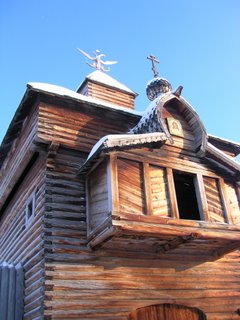
The next few days were spent accumulating more warm clothing, arranging a trip to Lake Baikal, and seeing the Decembrists’ museum. It wasn’t so much a museum as it was a house that some Decembrists lived in, but I enjoyed it a lot nonetheless. Liza wrote a paper on the Decembrists earlier that semester, so I got a free tour! For a good portion of my visit, it was too cold to go outside (apparently ‘too cold’ for Siberians is somewhere between –27 and –35 C), so Liza and I stayed with Mama Mila, watching movies and taking some visitors, mostly other Middlebury students studying in Irkutsk.
The Thursday before Russian Christmas (January 7th), Liza, Sara, Matty (two other Middkids), and I boarded a train for Baikal on which we’d spend the next three days touring the southern tip of the world’s deepest and largest fresh water lake (Lake Baikal is visible from space, holds one fifth of the world’s fresh water and is home to countless species of flora and fauna found only in its mystic wilderness!). Baikal was another big reason to see Irkutsk; Liza has made me jealous with her pictures of Baikal for some months now, and I wanted the chance to see it myself with my own two eyes. The train had an average of two or three excursions to scenic vista and through famous train tunnels a day. When we were too tired or otherwise incapacitated to take the cold walks with chipper Siberian teenagers, we just enjoyed each others company inside the train or made our own trips to take silly and breathtaking pictures (during one missed excursion through a 2km tunnel, I made my way down to the lake’s shore and gathered some of the world’s freshest water myself. It was by far the most delicious water I’ve tasted in my whole life).

More interesting than the guides’ anecdotes and tidbits of Baikal trivia were the people on our train. One always meets interesting people on the train, and our ‘Kruglobaikalskii’ Express was no exception. Being in the holiday season (which lasts from December 31st- approx. January 13th in Russia – essentially two weeks of national holiday), everyone was friendly and ready to meet new people. By coincidence, Colleen’s host sister, Tanya, was on the train with her boyfriend, Alyosha, who was visit over the holidays from St. Petersburg. They were great friends and even better guides through the world of Russian trains, making sure we made it back the to train before it continued on its way after a stop, met the standards of train etiquette and kept us out of trouble in times of gross intoxication (a common occurrence. I once had a Russian tell me, “Of course you should drink on the trains – what else is there to do?”). The people I met of the train made my trip to Siberia worth the cold and frostbite; they were the first Russians I had ever met that were genuinely interested in meeting Americans. For many of them, I was the first American they had ever met, which, besides being a great responsibility, was a great honor. I experienced true human contact just shooting the shit with my new Siberian friends, talking about Russian and American music, movies and anything else that bridges young people of different cultures.
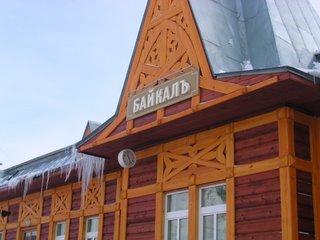
One of my sputniki (traveling companions), Misha, was from the Russian Caucuses and grew up close to the Chenen border. He was interested in hearing my thoughts on the Chechen War(s), a particularly touchy subject for Russians (see previous post “Problems”). I tried my best to be diplomatic, explaining that since the States was a colony of Britain at one time, most Americans are sympathetic to need some peoples have for their own freedom and independence. Although his rebuttal was harsh and, for the most part, racist, it was a treat to hear a Russian’s opinion on the matter, especially since he grew up so close to the conflict itself.
The most interesting character I met on the train was, however, Viktor Lediaev, a well-traveled native son of Irkutsk in his seventies. Our first night on the train, he went from cabin to cabin asking if anyone could sight-sing (or at the very least, read music by notes). I told him that I could, and he continued to announce a small contest he was having over the course of our three-day train ride. He had written his own lyrics to a well-known Soviet tango called ‘Drops (or Bubbles) of Champaign’. The first person on the train that could sing him his song would win a bottle of Sovietskoe Champaignskoe. As luck would have it, I was that person, and after singing his song with him, we opened the bottle of Champaign and had a pleasant conversation in which he shared with all of us his essays, ranging from topics of physics to philosophy, photographs from his travels (from all over Europe and the Middle East), and his stories, accumulated over a lifetime. He was a kind man with an easy, welcoming way about him whom I won’t soon forget.

Our three-day adventure on the train was also a much-needed Middkid powwow. Matty, Sara, Liza and I struggled through 2.5 grueling years of Russian language/culture at Middlebury together, and it was a great relief to finally share and compare our impressions and experiences in the Motherland. I had friends in Moscow who were also foreign students, some of which also came from Middlebury, but for some reason, I felt as though I had really come home in Siberia. Sharing our stories made me look back on my semester in Moscow with new eyes, which was much needed. I found that I acquired some perspective on my experience and was truly be able to see the good in all the bad times I had.
After the train ride, I had thirty-six hours left in Siberia, which I spent (of course) with Mama Mila and my friends. All the Middkids, along with Tanya, went to the banya together to clean our backs and our souls, and I left early the next morning completely satisfied with my visit. I wouldn’t give up my time in Moscow for anything, but in retrospect, if I had to do it all again, I think I would have gone to Irkutsk. Gossiping hostesses and sub-zero temperatures aside, it was a wonderful place that would have left me with a more ‘Russian’ experience to take home. Who knows; maybe I would have come back to the States with a little piece of that Russian soul as a souvenir.

Middkids in the banya!
Update
After a whirlwind month, I've finally slowed down enough to get some blogging done...well, in theory. January was filled with great adventures and wonderful stories, all of which you'll soon be hearing about as soon as I find the nearest Starbucks with free internet. (Yup, that's right! I said Starbucks! That can only mean one thing - I'M BACK IN THE WEST!)
Before that tremendous life change took place, though, I got to see the
real Russia on trips to Siberia and small villages near the Belorussian border. These were amazing experiences that were much needed if for no other reason than to get me out of Moscow.
I'm now in the process of settling into a new life in a new time zone in a new language, so bear with me. The stories (and pictures) are soon to come.
Happy surfing!
Mish
C Novym Godom! (Happy New Years!)
As a means of introduction, here is some Photoblogging of some of the Christmas (really New Year's) Trees around Moscow:
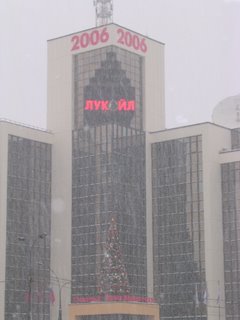


Our tree.


The Tree in our courtyard
So, to continue...
My New Years Eve began at o’dark thirty, walking to the metro to meet Lindsey. Her friend was flying in that day, and I agreed to accompany Lindsey to the airport to meet her friend. We got on the metro at eight; six metro stops and an hour-long bus ride later, we were at Sheremetovo Airport with two hours to kill since the flight was somewhat delayed. Being New Years Eve, finding myself in an airport, and knowing full well that it was five o’clock somewhere, I decided that the universe was telling me to drink and ordered a beer. Waiting and talking, Lindsey and I came to the conclusion that I should just get drunk and accidentally find myself on a plane to Petersburg so I could meet New Years and the love of my life, who probably lives on a street just like mine, in a building just like mine, in an apartment just like mine (for those not familiar with Russian New Years traditions…getting your friends drunk and on a plane out of town isn’t one of them. This is, however, the plot of the classic Soviet film “Ironia Sud’by ili S legkim Parom” – “The Irony of Fate, or Have a good Time at the Baths” – which Russians watch every year on December 31. Great film; I highly recommend it!). Luckily, the plane landed before I could order another beer and start the celebrations entirely too early and we waited outside of customs for Kate to arrive.
After taking the bus back to the Metro, we rode into the Center. I parted ways with the girls to go back to Izmailovskii Park (I hade been just the day before buying obscene amounts of pirated DVDs) to pick up a few things that weren’t there on Friday (not all the merchants come out for Fridays). I got a cristal decanter/shot glasses set for less that $13 and a pair of parade boots to wear back at Middlebury during Russian Choir concerts. I talked the guy down 400 rubles! This seemed like a huge accomplishment until I realized that this amount sounds a lot bigger in rubles than it does in dollars. Either way, I was happy with my purchases.
Haivng made it home, I talked a little with Tatiana Nikolaevna, who had spent most of the day cleaning. Although there’s the obvious concept of cleanliness and New Year’s cleaning, it seems to me that this is more of a superstitious think for Russians. Everything had to be pristine for the New Year; Tatiana asked me to throw away all old papers, old cloths that couldn’t be worn, etc. since they’re bad luck to keep into the New Year. This ritual cleanliness extends to people too, and Tatiana offered me first shower. I had showered just the day before and wasn’t really planning on taking a shower that day, but I knew Tatiana would either make a fuss or think of me as an absolute pig if I didn’t shower in New Years Eve. It felt good; I put on my nice cloths, the new boots and even wore a tie! I was ready for my night on the town!
Our evening’s celebrations started at an Ethiopian restaurant Sara found that a. was open on New Years Eve and b. didn’t close at some rediculously early time. It was very delicious food, not to mention my first time trying Ethiopian. There were seven of us all together since Sara also had two friends in town (one of whom was celebrating a birthday that night) plus one of their acquaintances, Earl: a man in his 40s-50s, recently divorced, apparently likes to relieve the pain of his mid-life crisis by hanging out with the young crowd. Earl does a lot of business in Russia/Poland and is over here quite often. He doesn’t speak enough Russian to get by, so he’s often ‘escorted’ by young Russian translators. He made me feel a little uncomfortable since I felt like I was eating dinner with my father (he actually looked like a fatter version of my dad, especially in the eyes and nose. If his voice had been deeper and soothing, I would have been really freaked out). He was one of those people that liked to talk about Russia/n/s and Moscow like he knew a lot about it, which he did to some extent, but it was a tourist’s education and I quickly tired of his lectures. To make things worse, a lot of the bars and clubs he recommended as really good are also well-known in Moscow as popular places for expat businessmen to find good hookers. He was a nice enough guy; it just struck me as strange that I was spending New Years with him. Of note: Ethiopian food is really fun to eat because you have to eat everything with your fingers! A few beers and a bottle of vodka later, we were off for Red Square!!!
We knew that the crowds and security at Red Square would be ridiculous, but we had NO IDEA just how ridiculous until we saw it with our own eyes. We got out at metro station Ploshchad’ Revolutsii, a very pretty station, which Christine, one of our guests, wanted to snap a few pictures of. Taking pictures in the metro is technically illegal, and I didn’t want to leave her alone taking them, especially since there were police all over the station. Chrisine, birthday-girl Rachel, friend Earl and I got separated from the rest of our group, so I jumped into action and got us as close to Red Square as I could.
As soon as we got out of the Metro, there were metal detectors and mobs of people just wanting to get through. I told my American friends to just be pushy and shove people a lot. There were a few times when I thought the crowd would just push their way through the police line; the metal detectors were swaying back and forth, screaming at all the metal that was going through. We made our way to the other side without a riot breaking out. The other, however, weren’t quite as lucky. The metro they came out of also had a security checkpoint that no one cared to pay attention to. The mob actually pushed the barricades over and stampeded their way to the festivities. I was jealous that I couldn’t have been involved in this excitement, but I’m glad Kate got to experience it, especially after being up on transatlantic flights for the last day and a half.
When we finally found each other, it was amazing. Everyone was drunk on the New Years spirit, shouting ‘S Novom Godom!!’ at the top of their lungs, setting off fireworks and lighting sparklers. There wasn’t a big ball dropping like Times Square, but you knew exactly when the clock struck 12 because everyone went absolutely wild! Below are some pictures I took. Security unfortunately wouldn’t let us any where near Red Square, so we settled for around the Kremlin.

Although not quite visible, this is a Dyed Moroz (Santa Claus) playing the clarinet.

This one was taken as someone walked through the crowd carrying a sparkler.



Chaos explodes at 12 o'clock outside The National hotel.
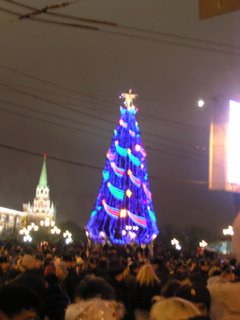

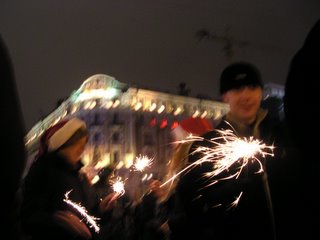


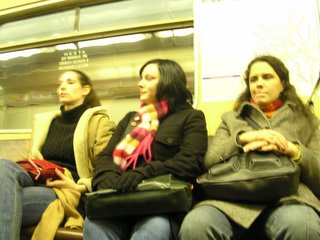
Christine, Kate, Lindsey
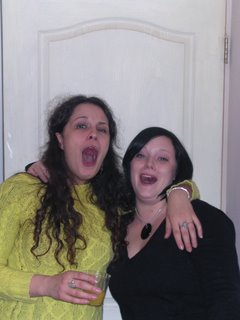
Lindsey and Kate

From the left: Me, Sara, Rachel, and Earl

Somehow, we ran into Steve, another grad student from Middlebury, in the craziness. He invited us over to his apartment and we celebrated New Years just like home…in a home, that is.
Happy New Years to all and hope 2006’ll be a good one!
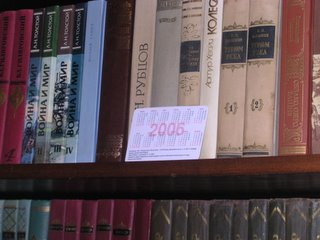
A reminder from Tatiana's bookshelf that 2006 is now upon us...you'll see the calandar to the left of "War and Peace" and above her TWELVE volume collection of Theodore Dreiser.
C Rozhdestvom Vas! (Merry Christmas to one and all!)
This week proved to be one of the more depressing of my past four months since I was raised believing it should be spent with family and those you love. Although there was a serious lack of blood relatives, I was surrounded by my ‘Moscow family’, whom I love dearly. My feelings of homesickness were complicated by the fact that it wasn’t even Christmas in Russia. The Orthodox Church celebrates the birth of Jesus Christ on the seventh of January, and in any event, this holiday is strictly religious, void of the majority of American associations with family, presents, friends and ‘that special time of year’. For Russians, the most similar holiday to ‘Catholic Christmas’ as they call it is New Years, traditionally spent with family at home with presents, at tree and well wishes for the future.
Christmas Eve Eve started with a midday trip to Gorky Park. Although there are many parks in Moscow, some charge entrance fees, Gorky Park being on of them. When you go to one of these parks, however, you’re not paying for (snow-covered) grass and trees; you’re paying for the attractions. These paying parks have rides for children and adults alike, numerous beer and treat stands as well as complete restaurants and pubs. This time of year, many parks ice over their sidewalks, allowing Muscovites to skate through their beloved cradles of ‘nature’ (not to mention give the proprietors another attraction to charge rental/use fees for). Since it was a chilly –10 C on Friday, Lindsey, Sara and I briefly enjoyed the sights and sounds of the unusually sunny day before deciding to seek shelter inside. We navigated our way to a pub that looked particularly warm without being taken out by ice or ice-skaters and warmed up with some borsch and chai. When we left an hour and a half later, the sun had for the most part retreated into the horizon (it was about 4:15pm) and we called it a day to spend the rest of the night in the warm comfort of our homes.
Christmas Eve was spent in true American fashion, desperately trying to finish that last minute shopping. The three of us went to Izmailovskii Park, which is not really a park, but a market of traditional crafts and souvenirs that’s only open on the weekends. Aside from the requisite matryoshkas, shot glass/decanter sets, and fur hats, Izmailovskii is also the best place in Moscow to buy pirated DVDs in English (they usually go for $3 a pop, but when buying in bulk, compromises can be made). Lindsey went wild and for 800 rubles (around $35) bought at least ten movies.
The sun wasn’t shinning as much as it had the day before and the temperature was even colder, so in the darkness of five o’clock, we called it a day and headed back to the dorms to warm up before our Christmas dinner, which we had planned to have at a nearby Uzbek restaurant. Uzbek food is not traditional yuletide fare for either Russia or the States; we just wanted to treat ourselves to a nice meal with friends. It was comforting to hear Christmas carols as we came into the restaurant and checked out coats in, although half of them were sung in Russian. It was a cozy atmosphere, decorated in the style of a near-Asian harem. This was quite confusing until after we placed our orders and the music took a dramatic change. After a Russian version of ‘Jingle Bells’, the DJ cranked up an Arab beat and belly dancers started gyrating their hips between the tables, tempting the restaurant’s customers for g-string tips. Although not the most traditional of Christmas entertainment, it was at least an interesting alternative.
Three belly dancing performances later, paced at thirty-minute intervals; we took our leave of the restaurant and went back to the dorms where the festivities continued. To lift our Christmas spirits, we sat down for a private viewing of “Elf”, which Lindsey had just bought at Izmailovskii. This was the first time I’d ever seen Will Ferrell’s masterpiece of Santaland comedy, and I enjoyed it immensely. By the end of the movie, we were all singing Christmas carols, smiling and making merry. It actually felt like Christmas and I was full-on Christmas happy for the first time that whole week.
More than family, Christmas at ‘home on the range’ and my grandmother’s cooking, I missed the atmosphere that the holidays create in the States. As soon as Thanksgiving’s over, everyone breaks out the Christmas trees, sales start and every city becomes somehow hypnotized by the holiday spirit. The world seems nicer somehow and everyone’s taken by the excitement of the season. While this is somewhat true for Russian New Years (the city is literally littered with fake trees, some as high as ten meters), the merriness, smiles and ‘goodwill toward man’ attitude is definitely lacking.
“Elf” renewed my sense of the holidays and I woke up on Christmas morning in the dorms, ran down to Lindsey and Sara’s room, jumping on the beds and yelling about opening presents. While polite, I don’t think my friends took this incarnation of the Christmas spirit as well as expected, so I went to the nearby Internet café to spread my holiday joy per email. This was a daunting enough task and occupied me until late afternoon when Adam and I met Chris at his apartment.
We planned a grand Christmas dinner with over fifteen people on the guest list. The problem was, we expected to cook everything in a two-hour period. As a result, we decided to keep things simple and just cook Russian food. We bought borsch in a box, rotisserie hen off the street, lots of wine and made mashed potatoes (without gravy, which is simply Russian potato purée). The only American traditional dish was Adam’s acorn squash, prepared with butter, cinnamon and sugar; it was quite tasty. Adam and I bought all the necessary ingredients and got back to Chris’s house to find the Russian guests had already arrived! We were understandably taken aback; when are Russians early for anything? In addition, I was quite embarrassed to have to unpack the groceries in front of them (in particular the borsch in a box); they were however polite of course and even offered to help peel the potatoes (Andrei ended up helping me, even teaching me the one Russian Christmas/New Years carol – Yolichka v lesu rastyot: The Little Christmas Tree grows in the Forest).
The rest of the guests arrived and we had ourselves quite the international gathering: Russians, Americans, a Venezuelan, two Belgians, a Pole…there was even a Byelorussian in the mix! What, you may ask, could unite such a diverse group? Charades, of course!! It was quite a fun and spirited game; my personal triumph was guessing Butros Butros Gali.
Around 9:30, the guests made their exits so that Chris could put a wound-up Nikita (his son) to sleep. On the way home, I bought some Baltika 8s (my favorite Russian beer) and settled down in my warm bed to wait for the requisite Christmas calls from the States. After hearing from family and friends (even Indiana, from Vienna), I went to the kitchen for some friendly conversation with Tatiana Nikolaevna. Seeing my half-empty bottle on the table seemed to throw her off.
“Oh, you’re having some beer. Right out of the bottle even.” I was confused at this comment as there aren’t any beer steins in the house and in general, I rather enjoy drinking out of glass bottles. Disregarding this comment, I began a conversation about the differences between Russian and American Christmas and New Years. As I mentioned before, New Years is the family holiday in Russia, but Tatiana cleared this up for me, explaining that this doesn’t necessarily mean that a single family sits at home all by themselves. Usually one family will invite others over as guests and everyone will celebrate together; the most important is that New Years is spent at a home, as opposed to in a restaurant or club.
I also asked Tatiana if Russians made New Years resolutions (a hard task as I don’t know the word for ‘resolution’ and had forgotten how to say ‘promise’). She corrected me, and said, “No, of course not, that’s stupid. Why would you make a promise you’re not going to keep anyway?”
Her response pleased me, as this is how I generally feel about New Years resolutions. She went on to describe a similar tradition when Russians make New Years wishes. At the stroke of midnight, you’re supposed to quickly write down a one or two word wish (‘love, happiness, mother’s health, etc.’ obviously thought of in advance) on a thin piece of paper (preferably unrolled cigarette paper) with a pencil, burn this wish with a match or candle (lighters are too unnatural) and drop the ashes into a shot of champagne. Before the clock tolls the twelfth hour, you should drink this mixture, and your wish will come true. Of course one is not allowed to share this wish with anyone. I have to admit, I really like this tradition. It’s non-committal and sounds like fun to do. Lindsey and I have resolved to do it this New Years, and I encourage one and all to try it out.
There’s still a couple days left until the official end of the Holiday Season (New Years), and I’d like to wish you all a (late) Merry Christmas and best wishes for joy, happiness and good times in the New Year.
A Trip to the Barber's
I woke up late on Thursday morning. Being officially done with my semester, I thought this would be a nice little treat to myself. Finally done with my academic semester in Russia, it was time to take care of the real business, namely getting a haircut. I have been scared of doing this since before I arrived in Moscow (I even tried growing my hair out last year so I wouldn’t have to deal with it). My first haircut was around Hallloween and was free, done by Chris and his electronic clippers. Needless to say, it’s gotten a little too cold in Moscow for the buzz cut, and when I woke up, I knew my time had come for a real trip to the parikmakhirskaia (barbershop, which literally means in Russian the person who makes wigs).
When Tatiana served me breakfast, the conversation did not center around my plans for the day as usual, but my earring. For those who don’t know, I have what’s called an Industrial piercing. It is a metal barbell that goes through the cartiladge of my left ear in two places. In the last four months, the subject of my (by Russian standards) unusual piercing has not been brought up by my hostess. I guess she finally worked up the courage to ask me about it.
“Does it hurt when you sleep?” she asked.
“Well, when I first got it, yes, but now I can sleep on it without discomfort.”
“Ah-ha. You know Mish, you really have to be careful when putting holes through your body, especially in a place like your ear. Have you ever heard of ‘akupunktsuariia’?”
I thought about the word…”Aaaah, accupuncture. Yeah, sure I’ve heard of it.”
“Well, you know all along your ear there are pressure points that all affect the rest of your body, different organs, etc. You really should be careful about that kind of stuff. Do you ever take it out?”
“No, it’s really not meant to be taken out. I would need a professional just to get it back in,” I responded. I had never really examined my thoughts on accupuncture. I have friends who swear by it, but having never experienced it myself, I would never base a decision to get a piercing on the ancient science. Tatiana Nikolaevna went on about a former boarder of hers (an Italian) who had her tongue and nose pierced, and how it was just horrible to mess around with your body like that. Luckily, my tongue ring was not in at the time (honestly, I’m not sure if her weathered eyes have ever really noticed it), so I politely nodded in agreement and changed the subject:
“You know, I think I’ll get my hair cut today. Do you know any places around here?”
She helpfully recommended a barbershop around the corner, assuring me that they specialize in men’s hair. I finished breakfast, took a shower, got dressed and was off to rid myself of the mane of hair that I had been unable to do anything with for months.
On my way to the salon, I practiced to myself what I would say to my stylist about how I wanted my hair to look. In the back of my mind, I was hoping they’d have those hairdo books available so I could just point something out.
When I arrived, I realized that I would have no such luck. An imposing man whose own haircut wasn’t what you would call a masterpiece quickly shuffled me into his seat.
“So, what do you want done?”
“I would like to keep my hair on top and make less the hair here,” I mumbled out with some body language to point out the hair under the level of my browline.
“Ok, yeah, yeah,” he said, filling in the gaps that my description left out. I let him know that my hair was clean and the experiment began.
During the course of the haircut, I studied how he did it, noticing that Russians have a very different way of cutting hair. I assumed that this was a result of different school of barbery between our two countries or that this man was just a ‘homeschooled’ barber. The majority of the cut continued in silence until he was almost done.
Having noticed my accent, he asked, “So, where are you from?” I responded and he started asking me the typical questions: what are you doing here? Why Russian? Etc., etc. He was quite kind and patient with my answers, and I started to feel comfortable making the small talk apparently required in all barbershops around the world. He started cleaning up the region around my ears (‘opening up my ears’ as he called it) and noticed my barbell.
“Wow, I’ve never seen one like that before. I hope a professional did that for you; you know, you really have to be careful with that kind of stuff what with all the nerve endings in your ears. You could really screw up the organs all over your body if it’s done wrong” It turns out most Russians are rather well acquainted with the dynamics and principles of accupuncture. Even barbers!
After a silence, I felt the need to hold up my end of the conversation:
“So, are you a Muscovite?” Like in New York, not everyone who lives in Moscow is actually a Muscovite, which is, in fact, a term reserved for those who grew up in the capital or have lived there for a considerable amount of time (judged usually by their acquisition of the Moscow accent).
“Well, I guess you could say that. I grew up in Yerevan,” he said, studying the look on my face to see if I knew where this was.
“Ahhh, Armenia?”
“Yeah. My Mom’s Russian and my Dad’s Armenian, so ya know. After institute, I moved here, married my wife. The usual.” I assumed that ‘institute’ isn’t a word used to describe beauty schools in Russian. His somewhat dishevled appearance was suddenly explained. The man must have been a scientist before, like many other citizens of the former Soviet Union, economic and political crises forced him to take up a more reliable profession. After all, people will always need haircuts, right?
“Interesting,” was the best response I could come up with.
“So, what kind of roots do you have?” my new friend Andrei asked. This is the second time a Russian has asked me about my ancestry while getting acquainted. During my first folklore lesson with Andrei Sergeevich, I was also asked to characterize my Northern European mutt descent. At the time, I assumed that this was a result of Andrei Sergeevich’s profession; as a folklorist, the man was obviously disposed to getting to know his roots as well as others’. Andrei, my barber, showed me that this interest might just be inherent in the culture, which for seventy years was extremely proud of their international character, much like America’s ‘big melting pot’ idea (indeed, the USSR national hymn was called ‘The International’).
“Well, northern-European. My family comes from Norway, Germany, etc.”
“Ah, so that’s both sides? Did they speak Norwegian in your house?”
“Well, no. We immigrated generations ago, and my Dad’s family is actually form Ireland and Scottland.”
“How many generations?” an odd question for most Americans. If I hadn’t done an ancestry project in fourth grade, I wouldn’t have been able to make even an educated guess to this answer:
“Oh, about three, four generation, I guess.”
“Ahh, I see. You know, there are a lot of famous Armenian-Americans; we had a pretty big diaspora. You know Andrei Agassi?” he asked. At first, I didn’t recognize this name, but then I put it through my Russian accent filter and recognized the famous tennis player.
“Oh really?”
“Yeah, his dad’s Armenian.”
“I had no idea!”
“Also Chear, the famous singer.” Again, I filtered the accent out of this name, whose vowel sound is particularly hard for Russians to pronounce.
“Cher?! No kidding!”
“Yeah, yeah.”
“I could see that, though. She has that beautiful dark hair, those eyes! Quite an Armenian face, really.” I thought, as a man was in the hair business, he’s appreciated this compliment to the beauty of his kinsmen’s follicles. I caught myself with the last comment though. In Russian, this ‘Armenian face’ expression is reminiscent of the expression ‘caucasian face’ which is a PC but nonetheless not polite way of talking about the face of terrorism in Russia. Luckily, he didn’t seem to take offense.
At this point, he was brushing the tiny bits of hair from the back of my neck and getting ready to style my new ‘do. I usually don’t like how other people style my hair, but it’s always fun to see how it all turns out. In any event, I usually enjoy getting to try out new hair products for free.
Before going to the reception to pay, Andrei slipped me his card:
“I also work at this other salon. It cheaper there, so if you’d ever like to come back, you should call me here. Go ahead,” he said, pantomiming and urging me to slip in indescreately into my pocket.
I paid my 650 rubles and went out into the chilly Moscow air a new man, slightly more Russian in appearance and happy to no longer be sporting the psuedo-mullet look.



































